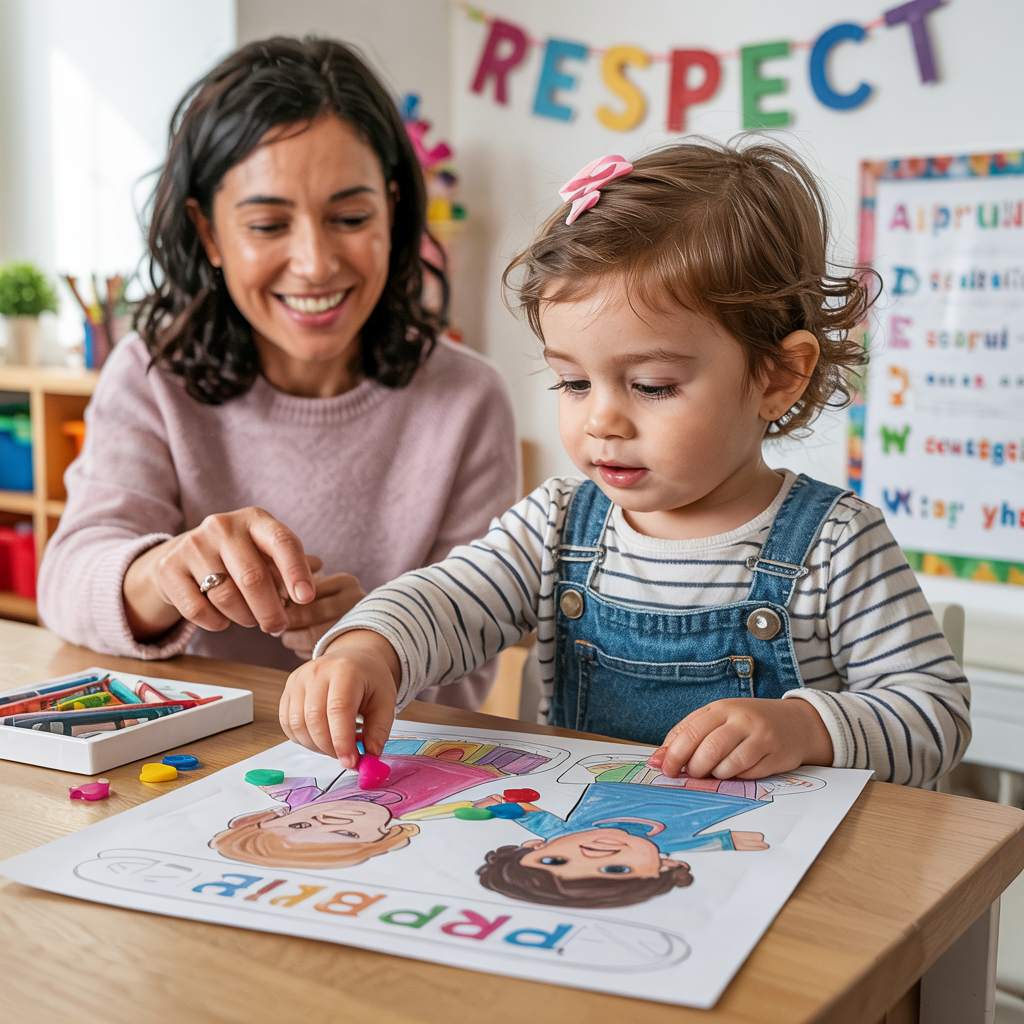How to Teach Young Children About Respect for Others
Respect is one of the most important values to teach children early in life. It helps them build positive relationships, understand the feelings and boundaries of others, and grow into kind, thoughtful individuals. With clear explanations, daily examples, and engaging activities, you can help young children understand what respect looks like in action.
Why Teaching Respect Matters
- Builds strong, healthy relationships
- Teaches empathy and consideration
- Promotes peaceful conflict resolution
- Encourages kindness and tolerance
- Fosters responsibility and self-respect
1. Explain Respect in Simple Words
Start with an easy-to-understand definition.
Activity Idea:
Say: “Respect means treating people the way you want to be treated.”
Use examples: “When we listen quietly, we show respect.”
Ask: “What are ways we can show respect today?”
What Kids Learn:
- Basic understanding of respect
- Everyday examples of respectful behavior
- Motivation to treat others kindly
2. Role-Play Respectful Scenarios
Practice helps children prepare for real life.
Activity Idea:
Use dolls or puppets to act out respectful situations like sharing toys or greeting others politely.
Praise good choices during role-play.
Ask: “How did the puppet show respect?”
What Kids Learn:
- Respectful responses in social situations
- Empathy through play
- Confidence in showing respect
3. Read Books About Respect
Stories make lessons relatable.
Activity Idea:
Read books like Hands Are Not for Hitting by Martine Agassi or Do Unto Otters by Laurie Keller.
Discuss: “What did the characters do to show respect?”
Draw pictures about respect from the story.
What Kids Learn:
- Story-based understanding of respect
- Recognizing respectful actions
- Emotional connection to the lesson
4. Model Respectful Behavior
Children learn by watching adults.
Activity Idea:
Show respect in your interactions: say “please” and “thank you,” listen without interrupting, and speak kindly.
Point out respectful moments: “I waited my turn because that shows respect.”
Apologize when necessary: “I’m sorry for raising my voice.”
What Kids Learn:
- Respectful communication
- Accountability for actions
- Everyday examples of respect
5. Use “Respect” as Part of Daily Language
Reinforce the concept throughout the day.
Activity Idea:
Say: “Thank you for respecting my words by listening.”
When setting rules, explain: “We keep our hands to ourselves to show respect.”
Praise moments of respect: “You respected your friend’s turn!”
What Kids Learn:
- Familiarity with respectful language
- How rules connect to respect
- Daily reminders of values
6. Teach About Respecting Differences
Help children appreciate diversity.
Activity Idea:
Read stories or show pictures of people from different cultures.
Discuss: “Everyone is special and deserves respect.”
Celebrate differences with crafts or cultural days.
What Kids Learn:
- Inclusion and appreciation of diversity
- Kindness toward all people
- Empathy for others’ experiences
7. Create a Respect Poster Together
Visual reminders reinforce values.
Activity Idea:
Make a poster with your child, using drawings or magazine cutouts to show ways to be respectful.
Hang the poster where it’s easily seen.
Refer to it during daily routines: “Let’s check our Respect Poster!”
What Kids Learn:
- Creativity and engagement with values
- Visual reinforcement
- Ownership of respectful behavior
8. Reflect on Respectful Moments
End the day with a positive review.
Activity Idea:
Ask: “How did you show respect today?”
Celebrate small moments: “You waited your turn at lunch—that was respectful!”
Plan for tomorrow: “What’s one way you can show respect tomorrow?”
What Kids Learn:
- Self-reflection and growth
- Positive reinforcement
- Motivation for future behavior
Final Thoughts
Teaching young children about respect helps them build meaningful relationships and grow into kind, thoughtful individuals. Through clear explanations, modeling, stories, and daily reflection, children learn that respect isn’t just about rules—it’s about caring for others and making the world a friendlier place. With every respectful choice, they help create a more understanding and connected community.
Aqui está a imagem ultra-realista para este artigo.
